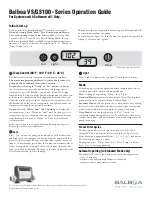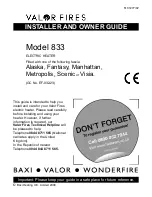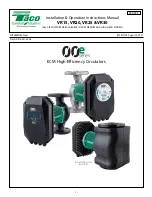
Water Heater Sounds
During the normal operation of the water heater, sounds or
noises may be heard. These noises are common and may
result from the following:
•
Normal expansion and contraction of metal parts during
the periods of heat-up and cool-down.
•
Condensation causing sizzling and popping within the
burner area.
•
Sediment build up in the tank bottom creating varying
amounts of noise. Build up may cause premature tank
failure. Drain and flush the tank as directed under
“Draining and Flushing”.
Safety Shut-off
This water heater is designed to automatically shut-off in the
event of the following:
•
The pilot flame is extinguished for any reason.
•
The water temperature exceeds 93°C (200°F).
•
Excessive combustion chamber temperatures.
•
The ignition of flammable vapours.
•
Excessive lint and or dust build-up
A dual safety switch is part of the water heater safety sys-
tem. The gas control is connected to a door-mount, manual
ly resettable safety switch which is designed to disable the
gas control/thermostat in the event of excessive combustion
chamber temperatures or a flammable vapour incident. If
the thermal switch opens, the water heater cannot be used
unless this thermal switch is reset by a qualified service
technician.
Milli-volt Models:
A thermocouple is used to determine if a pilot flame is pres-
ent and will shut off the gas supply to the main burner and
the pilot burner if the flame is absent.
24 Volt/Damper Models:
The 24 Volt control valve is in constant communications with
the different components that are connected to it, ensuring
all components are in the proper positions and in working
order.
The gas control has a high temperature limit switch or ECO
(Energy Cut Off) which is used to shut off the unit if the
water temperature exceeds 93°C (200°F). The ECO is
resettable. If the ECO has shutdown the water heater, the
water heater cannot be used until the gas control has been
inspected by a qualified service technician. Contact your
local dealer or a qualified service technician for service
information.
Anode/Water Odour
Each water heater contains at least one anode, which will
slowly deplete while protecting the glass-lined tank prolong-
ing the life of the water heater. Certain water conditions may
cause a reaction between the anode and the water. The
most common complaint associated with the anode is a “rot-
ten egg smell” produced by the presence of sulfur. Do not
remove this anode permanently as it will void any war-
ranties, stated or implied. An aluminum anode may reduce
if not eliminate water odour problems. The water supply sys-
tem may require special filtration equipment from a water
conditioning company to successfully eliminate all water
odour problems.
Artificially softened water is exceedingly corrosive because
the process substitutes sodium ions for magnesium and cal-
cium ions. The use of a water softener may decrease the life
of the water heater tank. The anode should be inspected
periodically. If the anode is more than 50% depleted, the
anode should be replaced.
– 20 –













































